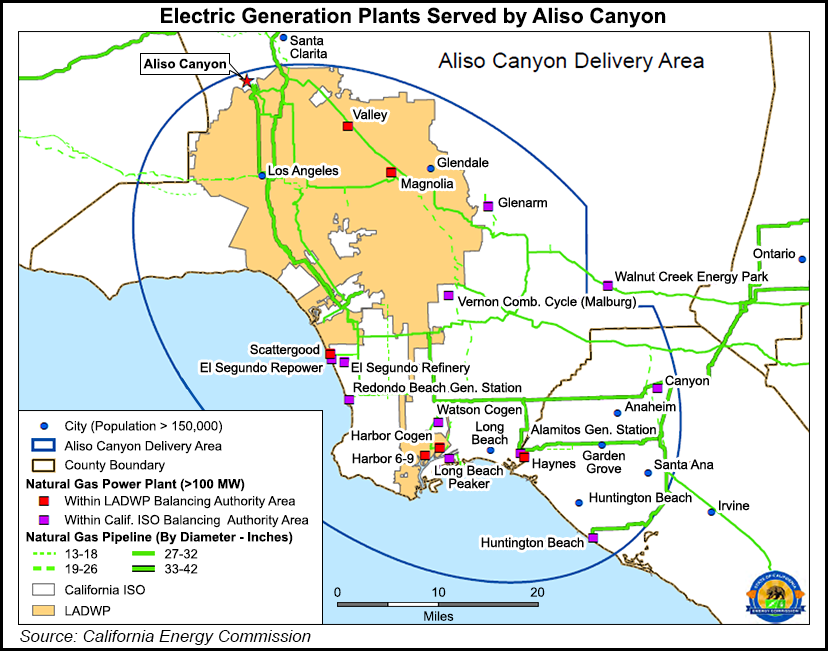Regulatory | NGI All News Access | NGI The Weekly Gas Market Report
California Governor Calls for Possibly Closing Aliso Canyon Natural Gas Facility
California Gov. Gavin Newsom this week tasked state regulators with identifying ways to permanently close the 86 Bcf, 3,200-acre Aliso Canyon natural gas storage facility north of Los Angeles.

Newsom late Monday called on the California Public Utilities Commission (CPUC) to hire an independent third-party expert to identify “viable alternatives” to the state’s largest gas storage facility, which is run by Southern California Gas Co. (SoCalGas) and has served the region since 1972. He also wants “scenarios” developed to speed up the process to close the facility, which over a four-month period in 2015-2016 suffered the biggest methane leak ever from a dysfunctional storage well.
Newsom expressed concerns about public health and safety, as well as projections for reduced reliance on gas as an energy source over the next 25 years. Reducing reliance on fossil fuels is one of the “shared goals” in California, he said, and closing Aliso would recognize “declining natural gas demand pursuant to state climate change targets.”
“We are fully prepared to launch an expert study of scenarios as requested in the governor’s letter,” said CPUC spokesperson Terrie Prosper.
While acknowledging ongoing work by the CPUC to “minimize or eliminate” reliance on Aliso, Newsom said the process was not moving fast enough to shutter the facility’s 100-plus underground storage wells.
SoCalGas spokesperson Chris Gilbride said closing Aliso has been looked at five times since the storage well leak. Newsom’s predecessor, former Gov. Jerry Brown, oversaw an independent study by the California Council on Science and Technology (CCST), which concluded Aliso should be kept open to ensure energy reliability and affordability. CCST called Aliso a “manageable risk,” and it cited the project’s contributions to state energy reliability and the pursuit of the state’s aggressive climate change mitigation goals.
“Natural gas stored at Aliso Canyon continues to help prevent service interruptions to large customers and power plants on high demand days,” said Gilbride, who said there are “growing concerns” in the state about having affordable, reliable energy systems, such as the Aliso facility.
Gilbride said Aliso is safe following upgrades since the leak and said nationally, the underground gas infrastructure has proven to be among the most resilient forms of energy during emergencies, from hurricanes to earthquakes and wildfires.
SoCalGas pointed to assessments by state agencies that have concluded Aliso is needed for energy reliability in Southern California since the leak was stopped in February 2016. Two years ago, the U.S. Department of Energy also has recommended reopening the facility.
© 2024 Natural Gas Intelligence. All rights reserved.
ISSN © 1532-1231 | ISSN © 2577-9877 | ISSN © 1532-1266 |
